Dive Brief:
- The U.S. Supreme Court heard arguments Monday regarding Janus v. American Federation of State County and Municipal Employees, a case that will have wide-ranging effects on the power of teacher’s unions and their ability to collect compulsory fees to support their advocacy and political efforts, Ed Source reports.
- A similar issue was heard by the Supreme Court two years ago in the case of Friedrichs v. CTA, which was brought to trial by 10 California teachers and ended in a split 4-4 decision following Justice Antonin Scalia's death.
- With the addition of Justice Neil Gorsuch, President Donald Trump’s nominee, court observers speculate the Supreme Court decision may not favor the unions this time, resulting in the potential loss of much of their funding and, consequently, their influence.
Dive Insight:
The Janus case challenges the legal authority of unions to collect compulsory fees from all employees they serve, even if the employee has refused to join the union and does not agree with union positions. The case was brought to the court’s attention by Mark Janus, a child-support specialist with the Illinois Department of Healthcare and Family Services who is compelled to pay about $45 a month for a “fair share” or agency fee to the public employee union. The union argues that the money is needed because it negotiates contracts and represents all employees, including Janus, on issues such as wages and working conditions. Janus argues that it violates his First Amendment right of free speech and association because he has no say in union positions and is forced to support political positions contrary to his own.
This case closely follows the case presented by 10 California teachers two years ago and will have implications for teacher unions across the nation when it is decided. Some fear a decision against the continuation of compulsory fees will weaken unions, where others fear it will kill them altogether. The effect of the lawsuit has been that teacher’s unions are at least having to work harder to connect with teachers in order to enlist their support. Some organizations, such as the Teacher Union Reform Network, are using this as an opportunity to change the narrative about unions and to advocate for “quality bargaining” that is more student-centered and involves parents and community members in the conversation.
The decision now hangs in the balance. At Monday’s Supreme Court hearing, Gorsuch gave no indication of his position on the matter. However, the union’s position did seem to be weakened at one point. According to a later EdSource article, Justice Kennedy asked David Frederick, the attorney representing the American Federation of State, County and Municipal Employees Illinois affiliate, if the loss would mean that unions would have less political influence. When Frederick said “yes”, Kennedy stated that Frederick had just made Janus’ point.









